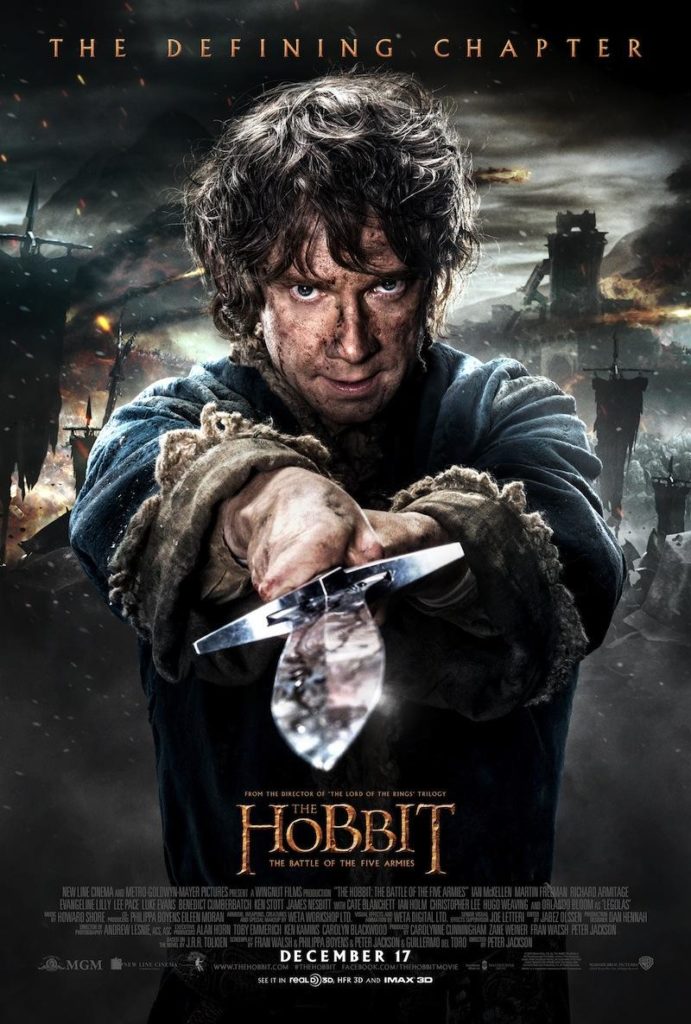Exploring ‘The Hobbit’ Chapter 18: The Return Journey
 J.R.R. Tolkien’s term “eucatastrophe” describes despair’s sudden turn to joy, but his grand finale for The Hobbit is anything but. As Bilbo says, victory “seems a very gloomy business.”
J.R.R. Tolkien’s term “eucatastrophe” describes despair’s sudden turn to joy, but his grand finale for The Hobbit is anything but. As Bilbo says, victory “seems a very gloomy business.”
I wonder if this fact alone will lead to some negative reviews for The Hobbit film trilogy as opposed to The Lord of the Rings film series. But if that’s a cause for criticism of the film, then the “blame” should fall first on Tolkien. Many casual fans believe this is a simpler child-friendly story set in Middle-earth — training wheels before riding The Lord of the Rings — but Tolkien leaves no place for the notion that victory isn’t always a joyous thing.
Readers and film-viewers beware: this section also includes a significant spoiler about who lives and who dies. Once again Tolkien subverts a fairy-tale reader’s expectations. Fans like to blame popular visual storytellers such as Steven Moffat and Joss Whedon for killing their favorite characters. Tolkien beat them to it. Not only that, but he arguably doesn’t even give the fallen and morally flawed hero a final act of redemption a la Boromir from The Lord of the Rings. In fact according to Tolkien, it is Beorn the mighty shape-shifter who arrives and turns the tide of battle. As for Thorin, Bilbo simply finds the Dwarf-king lies dying, Thorin utters last words of kindness to Bilbo — a repentance for his earlier sin — and then is gone.
Yet Tolkien makes this twist seem expected and even “traditional.” There is no postmodern shtick, no dark-gritty-reboot nonsense, and no “ha! silly readers, believing in redemption and moral goodness when the world is really about betrayal and blood and guts.” This is a leading question, but how does Tolkien avoid this? Should other authors maybe take note?
And now, as the final film draws nigh, onward to the next-to-final chapter of The Hobbit.
Chapter 18: The Return Journey
- “Victory after all, I suppose! … Well, it seems a very gloomy business.” (272) This theme continues from the previous chapter — what seems to be Tolkien’s view on war? How does it compare with God’s own revealed views on war, or the views of other stories?
- “Come!” [Gandalf] said more gravely. “You are called for […]” (273) Does this surprise you? What could have caused Thorin to repent(?) to Bilbo? Does the story even tell us?
- What could have led Thorin at the end to reject his gold-lust? Does Tolkien let us guess?
- “I wish Thorin were living, but I am glad that we parted in kindness.” (274) Thoughts?
- So it is actually Beorn in his fury that seems to save the day and turn the tide of battle. Though Beorn may be cool, would you have preferred that our heroes have that role?
- Fili and Kili had fallen defending him with shield and body, for he was their mother’s elder brother. (276) As if Thorin dying in battle wasn’t bad enough. How do you feel about a story’s central heroes perishing like this? How is it that a made-up story can generate such emotions — almost as if a real-life friend or family member had died? What might this reaction remind us about real death and suffering, and man’s creative abilities?
- How do these elements of the story’s end compare with the belief that fantasy tales and other stories are “escapism” — only sinful distraction from real life and real problems?
- What do you think the Elves and men thought of Thorin now? What may have changed? Why did Tolkien not choose to emphasize any specific change of their hearts, say, with a moment of them beholding Thorin’s heroics and saying, We were wrong about him?
- Bard buries the Arkenstone with Thorin and honors the previous arrangement. He also sends part of his share to the Master of Lake-town. What does this tell us about Bard?
- “If ever you are passing my way,” said Bilbo, “don’t wait to knock! Tea is at four; but any of you are welcome at any time!” Then he turned away. (278) What has caused this change between the personalities of chapter 1 Bilbo Baggins and chapter 18 Bilbo Baggins?
- How do you feel at the end of this chapter? What truths may lie behind that response?










































That’s assuming that they follow the end of the book. I don’t think they were puffing up fili and killi (whichever one has the elf girlfriend) just to have them die offscreen. I really don’t put it past Jackson to have even Thorin live.
I think the scene that affected me the most was Bilbo being knocked out, and waking up on the battlefield. To be honest, I never cared for Thorin or the rest of the dwarfs. It was moving that Thorin recognized his error, but the whole book was about Bilbo babysitting and saving them, and they didn’t come out too well. The serious end didn’t really help either; you go from cockney trolls and magic Gandalf to greed, death, and war.